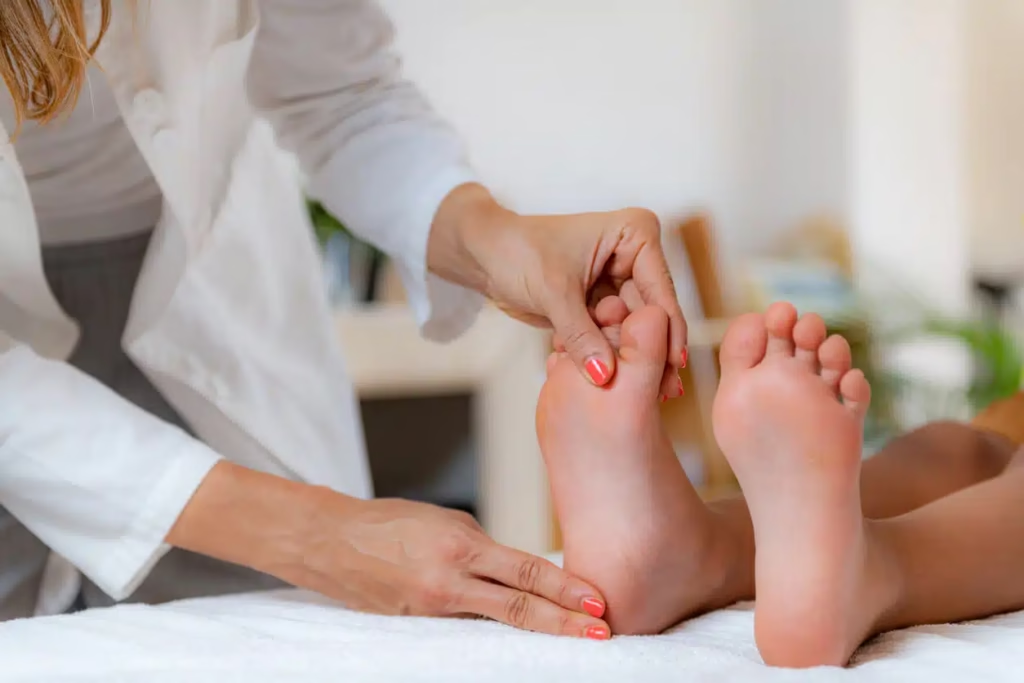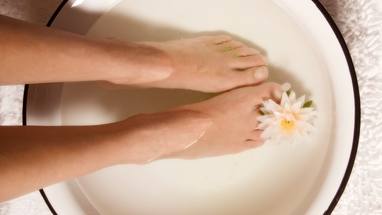Taking care of your feet is essential for your overall wellness. Many people overlook their feet until they experience pain or discomfort. Proper foot hygiene can prevent issues like fungal infections and athlete’s foot. Regularly washing and drying your feet, especially between the toes, is crucial to keep them clean and healthy. Neglecting foot care can lead to serious complications, especially for individuals with conditions like diabetes, where nerve damage and poor blood flow can increase the risk of infections.
Foot care is not just about aesthetics; it plays a significant role in maintaining mobility and quality of life. Each foot has 26 bones and numerous muscles, tendons, and ligaments that work together to support our daily activities. By prioritizing foot health, you can enhance your overall well-being and prevent issues that may limit your ability to move freely. Additionally, there is a strong Connection between Foot Health and Knee Pain; problems in the feet can lead to misalignment and strain on the knees, causing discomfort and pain over time.
Foot Care Tips for Overall Wellness

Common Foot Problems
Common Foot Problems include fungal nail infections, athlete’s foot, and ingrown toenails. These issues often arise in warm, dark, moist environments, making it important to keep your feet dry. If you notice cuts, sores, or swelling, it’s vital to inspect your feet regularly and seek treatment if necessary. Conditions like tinea pedis, caused by fungi, can lead to discomfort and require proper care to manage effectively.
In addition to fungal infections, other common foot ailments include corns, calluses, and blisters. These can result from wearing tight shoes or engaging in activities that put excessive pressure on your feet. Solutions for these problems include wearing properly fitting shoes, using protective pads, and maintaining good foot hygiene. Regularly checking your feet for any abnormalities and addressing them promptly can help prevent more serious complications down the line.
Daily Foot Care Routine
A simple daily routine can significantly improve your foot health. Start by washing your feet with soap and water, then dry them completely. Clipping toenails straight across can prevent ingrown toenails. Additionally, consider applying a moisturizer to keep the skin hydrated and prevent dryness and cracking. This routine is especially important in regions with dry climates, where the skin can lose moisture quickly.
Incorporating foot hygiene practices into your daily life can also help you avoid common foot problems. Changing socks regularly and ensuring they are clean and dry can prevent fungal infections. If you notice any signs of infection, such as redness or swelling, it’s essential to apply treatment promptly or consult a healthcare professional.

Choosing the Right Footwear
Wearing the right shoes is crucial for foot health. Ensure your shoes fit properly, allowing for a half inch of space at the toes. Avoid tight shoes that can cause discomfort and lead to issues like blisters or corns. Option for shoes that provide adequate support and cushioning, especially if you are active. Proper footwear can help prevent injuries and promote overall foot health.
When shopping for shoes, consider the type of activities you will be doing. Athletic shoes are designed for specific sports and can provide the necessary support for running or hiking. Additionally, be mindful of the materials used in your shoes, as breathable fabrics can help keep your feet dry and comfortable. Insoles can also play a significant role in foot health; they can alleviate conditions like plantar fasciitis by providing additional support and cushioning, helping to distribute pressure evenly across the foot.
Foot Exercises and Stretching
Incorporating foot exercises into your routine can strengthen your feet and improve flexibility. Simple exercises like rolling a tennis ball under your foot or doing the Legs-Up-the-Wall yoga pose can enhance circulation and relieve tension. Regular movement helps maintain blood flow and prevents stiffness, which is especially important for those who spend long hours on their feet.
Stretching your feet and ankles can also help prevent injuries and improve overall foot health. Consider adding stretches that target the calf muscles and the arches of your feet. These exercises can help alleviate discomfort and promote better alignment, reducing the risk of pain in the lower back and legs.
Signs to See a Podiatrist
If you experience persistent foot pain, swelling, or notice discolored nails, it may be time to consult a podiatrist. They can provide professional advice and treatment options tailored to your specific needs. Early intervention can prevent more serious issues down the line, such as infections or chronic pain conditions.
Regular check-ups with a podiatrist are especially important for individuals with diabetes, as they are at a higher risk for foot complications. A podiatrist can help monitor foot health and provide guidance on proper care techniques to prevent issues related to nerve damage and poor circulation.

Nutrition for Foot Health
What you eat can impact your foot health. A balanced diet rich in vitamins and minerals supports overall wellness, including your feet. Foods high in omega-3 fatty acids, like fish, can help reduce inflammation, while staying hydrated is essential for maintaining skin elasticity. Proper nutrition can also support bone health, which is crucial for preventing conditions like arthritis .
In addition to omega-3s, incorporating a variety of fruits and vegetables into your diet can provide essential nutrients that promote healing and overall foot health. Foods rich in calcium and vitamin D are particularly important for maintaining strong bones and preventing fractures.
Related Article: Common Foot Problems and Solutions
Preventing Foot Injuries
To prevent foot injuries, always wear appropriate footwear for your activities. If you’re running or hiking, choose shoes designed for those specific activities. Additionally, avoid walking barefoot in unfamiliar places to reduce the risk of cuts and infections. Being mindful of your surroundings can help protect your feet from potential hazards.
It’s also important to listen to your body. If you experience pain or discomfort while engaging in physical activities, take a break and assess your footwear and technique. Ignoring pain can lead to more serious injuries and long-term complications.
Foot Care Myths
There are many myths surrounding foot care, such as the belief that fish pedicures are safe. In reality, these practices can pose significant infection risks. Always choose a licensed salon that uses sterilized instruments for any foot treatments. Understanding the potential dangers of certain foot care practices can help you make informed decisions about your foot health.
Another common myth is that all foot pain is normal and should be ignored. In truth, persistent foot pain can be a sign of underlying issues that require medical attention. It’s essential to pay attention to your body’s signals and seek help when necessary.

Foot Care for Specific Populations
Certain groups, like those with diabetes, need to pay extra attention to their foot care. Regularly checking for cuts, sores, or signs of infection is crucial for preventing complications. Proper foot hygiene and regular check-ups with a healthcare provider can help manage risks associated with diabetes, such as neuropathy and poor circulation.
Athletes also have unique foot care needs due to the physical demands of their activities. They should focus on wearing appropriate footwear and incorporating recovery practices, such as stretching and massage, to maintain foot health and prevent injuries.
Foot Care Products
Using the right foot care products can enhance your routine. Look for lotions and creams designed to hydrate and protect your feet. Additionally, consider using pumice stones or callus shavers to maintain smooth skin and prevent buildup. Regular use of these products can help keep your feet looking and feeling their best.
When selecting foot care products, be mindful of ingredients. Option for products that are free from harsh chemicals and fragrances, as these can irritate sensitive skin. Natural ingredients like shea butter and coconut oil can provide effective hydration without causing adverse reactions.
Related Article: Insoles for High Arches
Cultural Practices in Foot Care
Different cultures have unique approaches to foot care. For example, some traditions emphasize the importance of foot massages and reflexology. Exploring these practices can provide new insights into maintaining healthy feet. Incorporating elements from various cultures can enrich your foot care routine and promote relaxation.
In some cultures, foot baths with herbs and essential oils are common for soothing tired feet. These practices not only provide physical benefits but also serve as a form of self-care that can enhance overall well-being.
Foot Care and Mental Health
Taking care of your feet can also positively impact your mental health. Engaging in foot care routines can be a form of self-care, promoting relaxation and reducing stress. Acknowledging the connection between physical and mental wellness is essential for maintaining a balanced lifestyle.
Additionally, foot massages and reflexology can provide therapeutic benefits that extend beyond physical relief. These practices can help alleviate tension and promote a sense of calm, contributing to improved mental health and overall well-being.

Foot Care in Different Seasons
Seasonal changes can affect your foot care needs. In winter, keeping your feet warm and dry is crucial, while summer may require more attention to sun protection. Adjusting your foot care routine according to the season can help maintain optimal foot health. For instance, using sunblock on your feet during summer can prevent sunburn.
In colder months, consider wearing moisture-wicking socks to keep your feet dry and warm. Additionally, be mindful of the types of shoes you wear, as proper insulation can help prevent frostbite and other cold-related injuries.
Innovations in Foot Care
Advancements in foot care technology are continually emerging. From new materials in footwear to innovative treatments for foot conditions, staying informed about these developments can help you make better choices for your foot health. For example, some brands now offer shoes designed with advanced cushioning and support systems to enhance comfort.
Research is also ongoing in the field of podiatry, focusing on improving treatments for common foot problems. Innovations such as 3D-printed orthotics and smart insoles that monitor foot health are becoming more accessible, providing individuals with personalized solutions for their foot care needs. These insoles can be particularly beneficial for those suffering from plantar fasciitis, as they help alleviate pain and provide necessary support.
Worried about your foot health? Visit Step Soothing to discover vital foot care tips. Learn How Life-Changing Arch Support for Flat Feet can Enhance Comfort, Improve Foot and Ankle Alignment, Provide Pain Relief, and much more!
People also Asked
What are the 5 Principles of Foot Care?
- Daily Hygiene: Wash your feet with soap and water, ensuring to dry thoroughly, especially between the toes.
- Proper Footwear: Choose shoes that fit well and provide adequate support to prevent discomfort and injuries.
- Moisturization: Apply lotion to keep skin hydrated, avoiding the areas between toes to prevent fungal infections.
- Nail Care: Trim toenails straight across to avoid ingrown nails and smooth edges with an emery board.
- Regular Check-ups: Visit a podiatrist for professional assessments, especially if you have underlying health conditions.
How Do You Keep Your Feet Healthy?
To keep your feet healthy, practice daily hygiene by washing and drying them thoroughly. Moisturize to prevent dryness and cracking, and wear well-fitting shoes that provide support. Engage in regular physical activity to improve circulation and strengthen foot muscles. Maintain a balanced diet rich in vitamins and minerals to support overall foot health. Regularly inspect your feet for any abnormalities or signs of infection.
What are the Advice for Foot Care?
Key advice for foot care includes inspecting your feet regularly for cuts, blisters, or changes in skin and nails. Avoid walking barefoot in public areas to reduce the risk of injuries and infections. Use foot powder if you have sweaty feet to keep them dry. Stay hydrated to maintain skin elasticity and overall health. If you experience persistent pain or notice concerning changes, consult a podiatrist for professional guidance.
How to Treat Your Feet Better?
To treat your feet better, incorporate regular foot massages to improve circulation and relieve tension. Warm soaks in Epsom salt can relax muscles and soothe soreness. Consider using insoles for additional support, especially if you suffer from conditions like plantar fasciitis. Limit high-heeled shoes to prevent strain and incorporate stretching exercises to enhance flexibility and prevent injuries.
What is Basic Foot Care?
Basic foot care involves daily washing with soap and water, ensuring thorough drying, especially between the toes. Moisturize your feet to keep the skin soft and prevent cracking. Maintain toenail health by trimming them straight across and filing edges to prevent ingrown nails. Wear well-fitting shoes that provide adequate support to avoid foot problems. Regularly check your feet for any signs of issues and seek professional help if needed.



